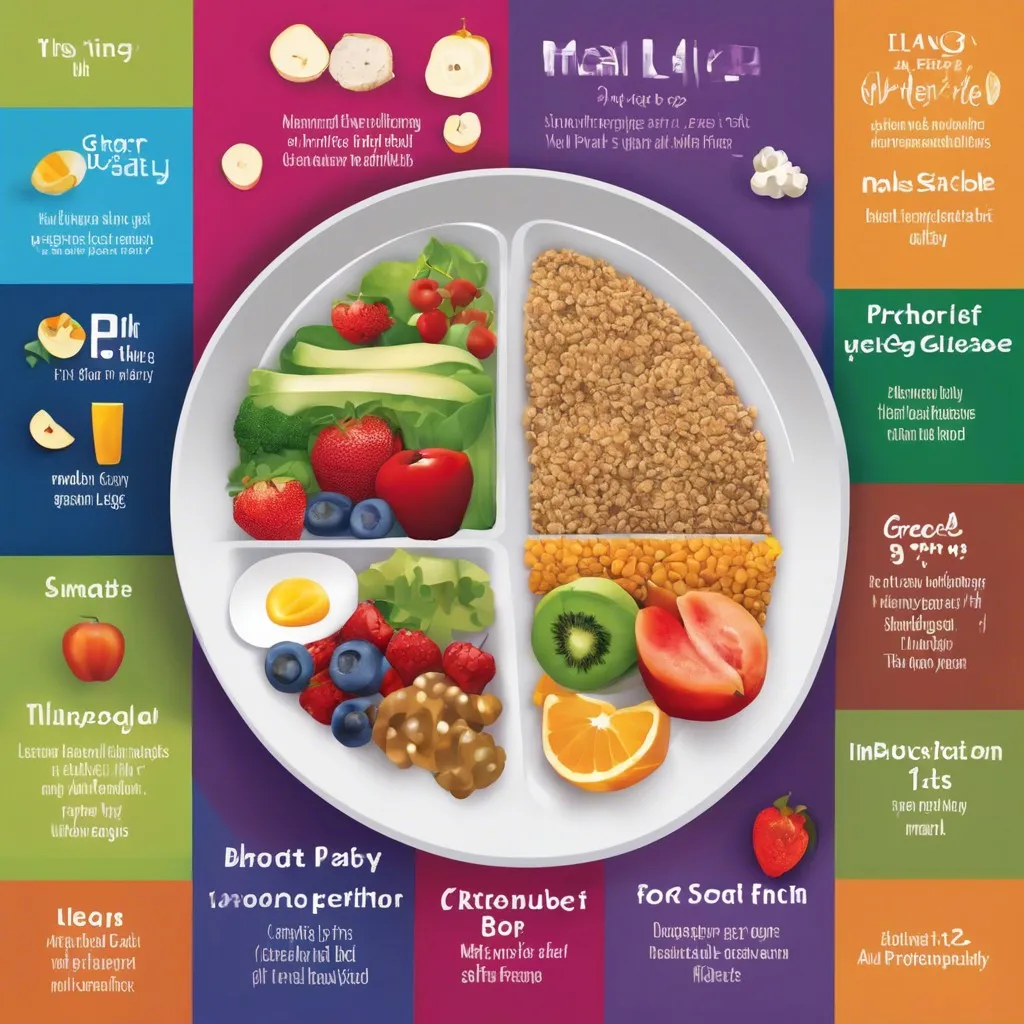Table of contents
- Mastering the Art of Understanding Blood Sugar
- Powerful Diets for Controlling Blood Sugar Levels
- Simple Lifestyle Adjustments to Reduce Blood Sugar Levels
- Taking Control of Your Blood Sugar: Expert Tips for Effective Management
- Satisfying and Nourishing Recipes for Blood Sugar Regulation
- Achieving Wellness with Diabetes: Effective Strategies for Management
In order to maintain stable blood sugar levels and avoid peaks throughout the day, it is essential to follow certain tips and guidelines. By understanding the factors that contribute to blood sugar spikes and implementing strategies to prevent them, individuals can experience improved overall health and wellbeing. This article provides valuable insights and practical tips on how to keep blood sugar levels in check, ensuring a stable day free from extreme fluctuations.
Mastering the Art of Understanding Blood Sugar
Blood sugar, also known as glucose, is the main source of energy for the body. It affects the body by providing fuel for the brain, muscles, and other organs. Maintaining stable blood sugar levels is crucial for overall health and well-being.
Powerful Diets for Controlling Blood Sugar Levels
Managing blood sugar levels is crucial for individuals with diabetes or insulin resistance. There are several popular diets that are commonly recommended for controlling blood sugar levels and improving overall health.
-
1. Mediterranean Diet
The Mediterranean diet emphasizes consuming fruits, vegetables, whole grains, lean proteins, and healthy fats. It has been shown to improve blood sugar control and reduce the risk of heart disease.
-
2. Low-Carb Diet
A low-carb diet restricts the intake of carbohydrates, including sugar, bread, and pasta. It helps regulate blood sugar levels by reducing insulin resistance and promoting weight loss.
-
3. DASH Diet
The DASH (Dietary Approaches to Stop Hypertension) diet focuses on consuming foods low in sodium and high in fruits, vegetables, whole grains, and lean proteins. It has been shown to lower blood sugar and decrease the risk of developing type 2 diabetes.
-
4. Plant-Based Diet
A plant-based diet emphasizes consuming fruits, vegetables, whole grains, legumes, and plant-based proteins. It can help manage blood sugar levels by improving insulin sensitivity and reducing inflammation.
-
5. Paleo Diet
The Paleo diet promotes consuming lean proteins, fruits, vegetables, nuts, and seeds while avoiding processed foods, grains, dairy, and added sugars. It may improve blood sugar control by reducing overall carbohydrate intake.
Simple Lifestyle Adjustments to Reduce Blood Sugar Levels
Maintaining a balanced diet, regular exercise, reducing stress levels, and getting quality sleep are all key lifestyle habits that can help stabilize blood sugar levels.
Taking Control of Your Blood Sugar: Expert Tips for Effective Management
Managing blood sugar levels is key to maintaining good health, especially for individuals with diabetes. With the right strategies in place, you can effectively take control of your blood sugar. Here are some practical advice from experts on managing blood sugar levels:
-
Monitor your blood sugar regularly
Regular monitoring of blood sugar levels is essential to understand how food, physical activity, and medication affect your blood sugar. Keeping a log of your readings can help identify patterns and make necessary adjustments to your management plan.
-
Follow a balanced diet
Eating a balanced diet that includes a variety of whole foods is crucial for blood sugar management. Focus on consuming lean proteins, healthy fats, complex carbohydrates, and plenty of fiber. Limit your intake of sugary foods and beverages.
-
Stay physically active
Regular exercise helps lower blood sugar levels and improves insulin sensitivity. Aim for at least 150 minutes of moderate-intensity aerobic activity per week, along with strength training exercises. Consult with your healthcare provider before starting any exercise regimen.
-
Take medication as prescribed
If you have been prescribed medication to manage your blood sugar, it is important to take it as directed by your healthcare provider. Skipping doses or altering the dosage without medical guidance can disrupt blood sugar control.
-
Manage stress levels
Stress can cause fluctuations in blood sugar levels. Incorporate stress management techniques such as deep breathing exercises, meditation, or engaging in activities you enjoy. Adequate sleep and a healthy work-life balance are also important.
-
Stay hydrated
Drinking enough water helps keep blood sugar levels stable. Aim to consume at least 8 glasses of water per day, and avoid sugary drinks which can raise blood sugar levels.
-
Educate yourself
Stay informed about diabetes and blood sugar management by attending educational programs and workshops, reading reputable sources, and staying in touch with your healthcare team. Knowledge empowers you to make informed decisions.
-
Seek support
Living with a condition that requires blood sugar management can be challenging. Join support groups or connect with others who are going through similar experiences. Share your concerns, seek advice, and learn from each other's strategies.
-
Maintain regular check-ups
Regular visits to your healthcare provider are crucial to monitor your blood sugar control, evaluate the effectiveness of your management plan, and make any necessary adjustments. Address any concerns or difficulties you may be facing.
-
Keep a positive mindset
Managing blood sugar levels can be a lifelong journey, but maintaining a positive mindset is important. Celebrate your successes, learn from setbacks, and remember that with consistent effort, you can effectively manage your blood sugar and maintain good health.
Satisfying and Nourishing Recipes for Blood Sugar Regulation
Maintaining stable blood sugar levels is crucial for overall health. Here are some delicious and nutritious recipes that can help regulate blood sugar. Start your day with a protein-packed breakfast like a veggie omelette or a bowl of Greek yogurt topped with berries. For lunch, enjoy a hearty salad with lean protein like grilled chicken or tofu. Snack on nuts, seeds, or sliced vegetables with hummus. For dinner, opt for baked salmon with roasted vegetables or a stir-fry with lean meat and lots of colorful veggies. These recipes provide essential nutrients while keeping blood sugar levels stable.
Achieving Wellness with Diabetes: Effective Strategies for Management
Blood sugar management plays a vital role in diabetes prevention. By effectively managing blood sugar levels, individuals can significantly reduce their risk of developing diabetes. Here are some key points to consider:
- Maintaining stable blood sugar levels: Consistently high or low blood sugar levels can contribute to the development of diabetes. By managing blood sugar levels through healthy eating, regular physical activity, and medication (if necessary), individuals can prevent the onset of diabetes.
- Controlling weight: Excess weight is a major risk factor for diabetes. By managing blood sugar levels, individuals can effectively control their weight, reducing the risk of developing diabetes.
- Eating a balanced diet: Consuming a balanced diet rich in whole grains, lean proteins, fruits, and vegetables is crucial for blood sugar management. This helps stabilize blood glucose levels and prevents spikes and drops that can lead to diabetes.
- Engaging in regular physical activity: Exercise helps improve insulin sensitivity and promotes weight loss, both of which contribute to blood sugar management and diabetes prevention.
- Monitoring blood sugar levels: Regular monitoring of blood sugar levels allows individuals to identify any deviations from the normal range and take appropriate measures to manage them. This helps prevent the progression to diabetes.
- Managing stress: Chronic stress can affect blood sugar levels and increase the risk of developing diabetes. Implementing stress management techniques, such as exercise, meditation, and hobbies, can help maintain healthy blood sugar levels.
- Getting regular check-ups: Regular check-ups with healthcare professionals provide opportunities to assess blood sugar levels, discuss any concerns, and receive guidance on effective diabetes prevention strategies.
In conclusion, managing blood sugar levels throughout the day is crucial for maintaining stable energy levels and overall well-being. By following these tips for minimizing blood sugar spikes, individuals can prevent the sharp peaks and crashes that can occur. Incorporating a balanced diet, regular exercise, portion control, and mindful eating practices are all effective strategies for keeping blood sugar levels stable. Additionally, staying hydrated and managing stress levels can also contribute to a more stable day. Making these small lifestyle changes can have a significant impact on overall health and ensure a more steady and energized day.
Frequently asked questions related to minimized blood sugar spikes
What causes blood sugar spikes?
Blood sugar spikes are often caused by consuming foods that are high in carbohydrates, such as sugary drinks, pastries, and white bread. Additionally, stress, lack of physical activity, and certain medications can also contribute to blood sugar spikes.
How can I prevent blood sugar spikes?
To prevent blood sugar spikes, it is important to follow a balanced diet that includes a variety of whole foods. This means choosing complex carbohydrates over refined ones, such as whole grains instead of white rice or bread. Regular exercise, stress management techniques, and medication management can also help prevent blood sugar spikes.
What role does exercise play in preventing blood sugar spikes?
Regular exercise helps improve insulin sensitivity, which allows your cells to better utilize glucose from the bloodstream. This can help prevent blood sugar spikes. Aim for at least 150 minutes of moderate-intensity aerobic exercise per week, along with strength training exercises.
How can stress management techniques help prevent blood sugar spikes?
Stress can cause an increase in blood sugar levels. Implementing stress management techniques such as deep breathing exercises, meditation, yoga, and regular relaxation can help lower stress levels and prevent blood sugar spikes.
Are there any medications that can help prevent blood sugar spikes?
There are several medications available for managing blood sugar levels, including oral medications and insulin injections. It is important to work with a healthcare professional to determine the best medication regimen for your specific needs.
Can alcohol consumption affect blood sugar levels?
Yes, alcohol can affect blood sugar levels. It can cause blood sugar levels to initially rise due to the carbohydrate content, but it can also lead to hypoglycemia (low blood sugar) later on. It is important to consume alcohol in moderation and monitor blood sugar levels closely if you have diabetes.
What are some tips for managing blood sugar levels throughout the day?
Some tips for managing blood sugar levels throughout the day include eating regular, balanced meals and snacks, monitoring carbohydrate intake, staying hydrated, exercising regularly, managing stress levels, getting enough sleep, and working closely with a healthcare professional.
Is it necessary to avoid all carbohydrates to prevent blood sugar spikes?
No, it is not necessary to avoid all carbohydrates. It is more important to focus on choosing the right types of carbohydrates and consuming them in moderation. Opt for complex carbohydrates that are high in fiber, such as whole grains, fruits, and vegetables, as they are digested more slowly and have a smaller impact on blood sugar levels.
What are some examples of foods that cause blood sugar spikes?
Foods that are high in carbohydrates and have a high glycemic index tend to cause blood sugar spikes. Some examples include white bread, white rice, pasta, sugary drinks, pastries, and desserts.







